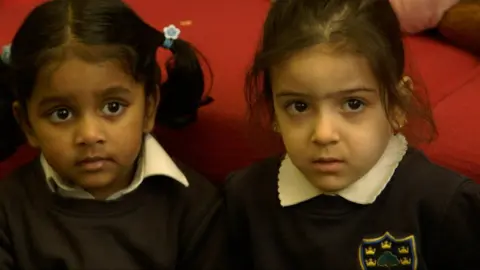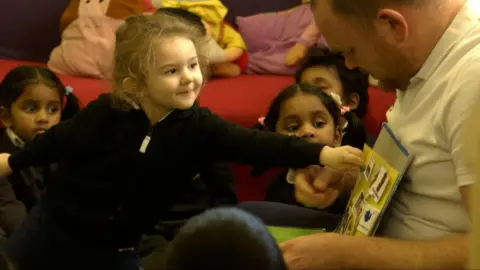'Men can be nursery teachers too'
Two in three councils providing nursery services do not employ any men, the Victoria Derbyshire programme has learned. How can diversity in the profession be improved?
"A lot of men don't see it as a man's job and a lot of men are not aware that the role even exists," says Jamel Campbell, who started teaching the under-fives 16 years ago.
He is still frustrated by how little status is given to his job.
"People are entrusting their precious babies to us, to care for them and to teach them," he says. "There is a lot of stigma based on negative stories - children being at harm... men not being nurturing, men not being able to work with children that small."
Early years education runs from birth until children are five, including preschools, nurseries and school reception classes.
Of 400,000 early years educators, 98% are female. The starting salary for nursery practitioners is about £18k.
In England, a Level 3 Early Years Educator qualification is needed, which takes one to two years to complete, depending on experience.

Jamel, who works for the London Early Years Foundation, says more men would be interested if they understood the benefits of a balanced workforce.
"Some children out there may not have a male in their home, there needs to be balance, they need to have that interaction," he says. "It breaks down that whole, 'you have to be macho to be a male,' thing. It shows them men can be silly, can play, make jokes, can give you a hug if you've fallen down."
While the majority of nurseries are privately-run, some councils do still provide facilities. Of the 38 councils in England, Scotland and Wales which still have in-house nurseries, 26 do not hire a single male teacher.
'Air of suspicion'
But when men take jobs, some can still face prejudice.
"James," 23, started his first job in Leeds in January. But on his first day, parents had him removed from a class.

"I'd been there maybe 20 minutes. [They said] 'I'm sorry, we need to move you, I'll explain in the corridor,' and he explained that because I was a man, it wouldn't be appropriate for me to work in early years. Basically, 'because of safeguarding concerns we're worried particularly what the parents might think' and stuff like that. So I ended up being moved to Year Four," he explains.
"I was obviously shocked, I'd heard stories and rumours that this was the kind of thing that you could expect, that if you were a man in early years there would be this air of suspicion around you, that men can't be trusted."
A year ago, a government report highlighted the lack of gender diversity in the early years sector.
It said employing more men would plug the gap in nearly 25,000 early year job vacancies and increase the number of male role models for children. It launched a task force to achieve this.
Men dissuaded
Its chairman, David Wright, of Paintpot Nurseries in Southampton, exclusively showed the programme the proposals he will be sending the government in the spring.
They include improving pay and conditions, a national campaign promoting gender-diverse early years, more support for men on training and placements and to agree a target for the percentage of men in the workforce.
And, crucially, it will recommend that Ofsted could include gender diversity in their inspection criteria.

Mr Wright said there was a problem attracting good staff, with 50% of the population not thinking of it as a career.
"If you were a 16-year-old lad looking to come and work with young children you would be dissuaded by your parents, by career advisers and teachers. And then there's the whole sense around your masculinity, do you tell your friends that you are entering a workforce where you are in the minority?
"I don't think it's been on the government's agenda at all."
Men as nurturing
One school in east London has spent ten years ensuring male and female teachers spend an equal amount of time with the pupils to narrow the gap between the attainment levels of boys and girls.
Bob Drew, headteacher at Gearies Primary school, said: "They see men as positives, men reading books, men talking about things and being successful in careers. There has been a tendency in the past for most of primary education being heavily dominated by women. It's important they see men are nurturing, and not just sporting heroes."
In Bradford, 7% of nursery teachers employed by the council are male - 2.5 times the national average. Some organisations have employed dads to volunteer at reading groups - which is not only good for children, but a good pipeline for men to join the profession.
Mohammed Bilal, a teacher at St Edmunds Nursery, said fathers attending the sessions was a novelty for the children and had a positive impact on them.
"Children tend to start to think 'my dad's doing it with me,' so they tend to concentrate a lot more, get involved a lot more," he said. "Especially with the boys."
Muhammed Waqas volunteered at the group and is now training himself.
"More dads are into these groups. If I hadn't seen another male working in this sector I wouldn't have thought about joining it," he explained.
Watch the BBC's Victoria Derbyshire programme on weekdays between 09:00 and 11:00 on BBC Two and the BBC News Channel.
